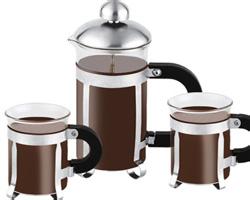(单词翻译:单击)
"From the beginning, the French devoted more attention than any other people to coffee brewing," William Harrison Ukers wrote in "All About Coffee," published in 1922. The first French coffee maker appeared around 1800, Ukers claimed, and the first one made of glass followed 40 years later. Though Ukers's encyclopedic work defined dozens of devices, it never mentioned the simple plunger-style vessel that we've come to call the "French press."
“从一开始,法国人对煮咖啡就比别人都用心,”威廉·哈里森·阿克斯(William Harrison Ukers)在1922年的《关于咖啡的一切》(All About Coffee)中写道。他说,第一个法式咖啡壶是在1800年左右出现,四十年后,又出现了第一个玻璃咖啡壶。尽管阿克斯百科全书式的作品描述了几十种器具,却没提到那种泵状装置,也就是我们今天所谓的“法式压滤壶”(French press)。
That coffee maker — known as the cafetière in Britain — wasn't popular until after Ukers's death, but the technology was around long before he wrote his book. In March 1852, a Paris metalsmith and a merchant received a joint patent for "the filtering of coffee by means of a piston." The patent described a rod attached to a piece of tin pierced with holes and sandwiched between two layers of flannel. The rod would be pressed by hand into a cylindrical vessel. "By lowering the piston," the inventors wrote, "filtered coffee is obtained above it, perfectly clear."
这种咖啡壶在英式英语中被称为"cafetière",到阿克斯去世后才流行起来,但这种技术却早在他写书之前就有了。1852年3月,一个法国的金属加工技工和一个商人因“以活塞方式过滤咖啡”而联合取得了一项专利。这项专利是用一根活杆连着一片带有网眼,被两层法兰绒夹在中间的锡箔,用手把活杆压入圆柱形容器内。发明者介绍:“向下压动活塞,过滤后的咖啡就涌上来,非常清澈。”

But the French press did not become well known until the late 1920s, when a Milanese firm patented a version of the French invention. The company perfected the device in the years that followed: A version introduced in 1935 had a spring that wrapped around the plunger discs to hold them flush with the cylinder.
但是法式压滤壶直到20世纪20年代才为世人所知,当时一个米兰工厂为这项法国发明的一个版本申请专利。其后这家公司又改良了这种设备。1935年推出的一个型号有一个弹簧包裹在泵盘周围,让泵盘可以水平地压入圆柱容器。
A similar design spread through Europe in the 1950s. But it took a while for the gadget to make its way to the United States, and still longer for it to gain its current appellation. (Even now, the Oxford English Dictionary defines the French press first and foremost as an exercise designed to "develop and strengthen the biceps.") As of the early 1980s, some Americans followed British usage and called it a cafetière; others used the phrase "French plunger-type." In 1993, Florence Fabricant explained the "French-press method" to readers of The New York Times as a favorite of connoisseurs. The method had one major drawback, she noted: "The coffee is sometimes muddy."
20世纪50年代,类似的设计开始在欧洲传播开来。但过了一段时期,这个小玩意才来到美国,又过了很久才获得现在的名号(直至如今,《牛津英语词典》中"French press"下的第一条解释还是“锻炼和增强二头肌的练习”的一种运动方式)。到了20世纪80年代初,有些美国人仿照英国人的说法,把它叫做"cafetière";有些人用“法式压滤型咖啡壶”来称呼它。1993年,弗洛伦斯·法布里肯特(Florence Fabricant)对《纽约时报》的读者们解释说,“法式压滤法”是行家们的最爱。不过她说,这种方法有个重大缺点:“咖啡有时会有点浑浊”。


